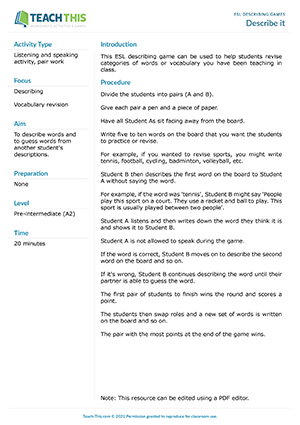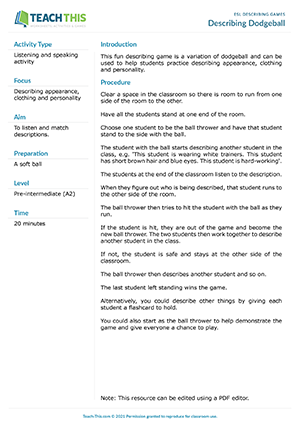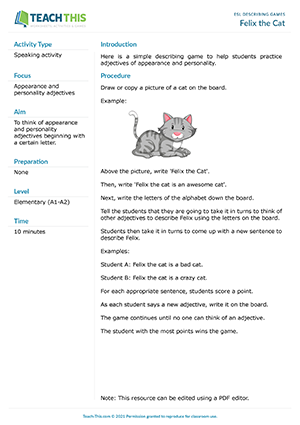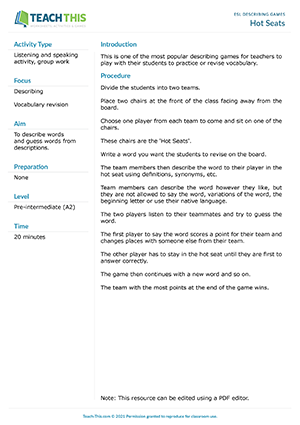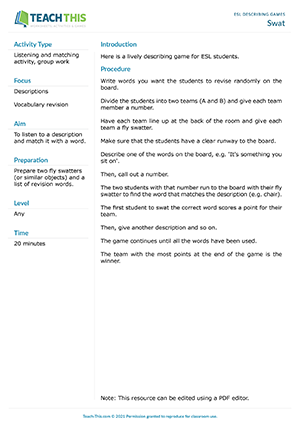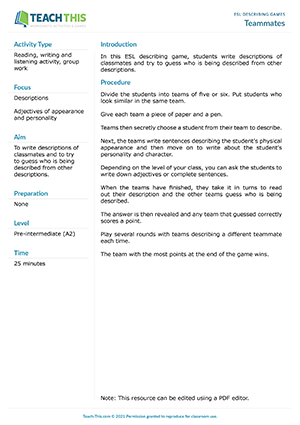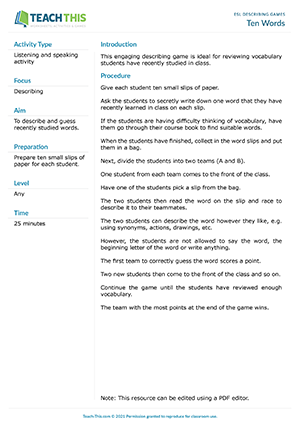ESL Describing Games
ESL Describing Game - Vocabulary and Speaking: Describing, Guessing - Pair Work - Pre-intermediate (A2) - 20 minutes
This ESL describing game can be used to help students revise categories of words or vocabulary you have been teaching in class. In pairs, Student A sits facing away from the board. Write five to ten words on the board that you want the students to practice or revise. For example, if you wanted to revise sports, you might write tennis, football, etc. Student B then describes the first word on the board to Student A without saying the word. For example, if the word was 'tennis', Student B might say 'People play this sport on a court. They use a racket and ball to play'. Student A listens and then writes down the word they think it is and shows it to Student B. Student A is not allowed to speak during the game. If the word is correct, Student B moves on to describe the second word and so on. If not, Student B continues describing the word. The first pair of students to finish wins the round and scores a point. Students then swap roles and a new set of words is written on the board and so on. The pair with the most points at the end of the game wins.
ESL Describing Game - Vocabulary and Speaking: Describing - Pre-intermediate (A2-B1) - 20 minutes
This fun describing game is a variation of dodgeball and can be used to help students practice describing appearance, clothing and personality. Clear a space in the classroom, so there is room to run from one side of the room to the other. All the students stand at one end of the room. Choose one student to be the ball thrower. That student stands to the side with the ball. The student with the ball starts describing another student in the class, e.g. 'This student is wearing white trainers. This student has short brown hair and blue eyes. This student is hard-working'. When the students figure out who is being described, that student runs to the other side of the room. The ball thrower then tries to hit the student with the ball as they run. If the student is hit, they are out of the game and become the new ball thrower. The two students then work together to describe another student in the class. If not, the student is safe and stays at the other side of the classroom. The ball thrower then describes another student and so on. The last student left standing wins the game. Alternatively, you could describe other things by giving each student a flashcard to hold.
ESL Describing Game - Writing: Writing Collocations and Descriptions - Group Work - Pre-intermediate (A2-B1) - 25 minutes
In this descriptions game, students describe things they see in a short video clip. To begin, teams watch a short video clip and write down as many descriptions as they can from what they see in the video. For each suitable adjective-noun collocation the students write down, they score one point, e.g. sports car. For each complete sentence describing part of the video, students score five points, e.g. 'The man in the red sports car is driving fast'. At the end of the video, go through each team's answers. The team with the most points wins the game. This game can also be used to practice verbs, prepositions, etc.
ESL Describing Game - Vocabulary and Speaking: Forming Sentences - Pre-intermediate (A2) - 10 minutes
Here is a simple describing game to help students practice adjectives of appearance and personality. Draw or copy a picture of a cat on the board and above the picture, write 'Felix the Cat'. Then, write 'Felix the cat is an awesome cat'. Next, write the letters of the alphabet down the board. Tell the students that they are going to take it in turns to think of other adjectives to describe Felix using the letters on the board. Students then take it in turns to come up with a new sentence to describe Felix, e.g. 'Felix the cat is a bad cat'. For each appropriate sentence, students score a point. As each student says a new adjective, write it on the board. The game continues until no one can think of an adjective. The student with the most points wins the game.
ESL Describing Game - Vocabulary and Speaking: Describing, Guessing - Group Work - Any Level - 20 minutes
This is one of the most popular describing games for teachers to play with their students to practice or revise vocabulary. Place two chairs at the front of the class facing away from the board. Choose one player from each team to come and sit on one of the chairs. These chairs are the 'Hot Seats'. Write a word you want the students to revise on the board. The team members then describe the word to their player in the hot seat using definitions, synonyms, etc. Team members can describe the word however they like, but they are not allowed to say the word, variations of the word, the beginning letter or use their native language. The two players listen to their teammates and try to guess the word. The first player to say the word scores a point for their team and changes places with someone else from their team. The other player has to stay in the hot seat until they are first to answer correctly. The game then continues with a new word and so on. The team with the most points at the end of the game wins.
ESL Describing Game - Vocabulary and Listening: Matching, Identifying - Group Work - Any Level - 20 minutes
Here is a lively describing game for ESL students. Write words you want the students to revise randomly on the board. Each team lines up at the back of the room. Give each team a fly swatter. Describe one of the words on the board, e.g. 'It's something you sit on'. Then, call out a number. The two students with that number run to the board with their fly swatter to find the word that matches the description (e.g. chair). The first student to swat the correct word scores a point for their team. Then, give another description and so on. The game continues until all the words have been used. The team with the most points at the end of the game is the winner.
ESL Describing Game - Vocabulary and Writing: Writing Descriptions, Guessing - Group Work - Any Level - 25 minutes
In this ESL describing game, students write descriptions of classmates and try to guess who is being described from other descriptions. Put students who look similar in teams. Teams then secretly choose a student from their team to describe. Next, teams write sentences describing the student's physical appearance and then move on to write about the student's personality and character. Depending on the level of your class, you can ask the students to write down adjectives or complete sentences. When the teams have finished, they take it in turns to read out their description and the other teams guess who is being described. The answer is then revealed and any team that guessed correctly scores a point. Play several rounds with teams describing a different teammate each time. The team with the most points at the end of the game wins.
ESL Describing Game - Vocabulary and Speaking: Describing, Guessing, Revision - Group Work - Any Level - 25 minutes
This engaging describing game is ideal for reviewing vocabulary students have recently studied in class. To start, students secretly write down ten words that they have recently learned in class on slips of paper. Next, collect in the word slips and put them in a bag. Then, divide the students into two teams. One student from each team comes to the front of the class. One of the students picks a slip from the bag. The two students then read the word on the slip and race to describe it to their teammates. The two students can describe the word however they like, e.g. using synonyms, actions, drawings, etc. However, the students are not allowed to say the word, the beginning letter of the word or write anything. The first team to correctly guess the word scores a point. Two new students then come to the front of the class and so on. The team with the most points at the end of the game wins.


